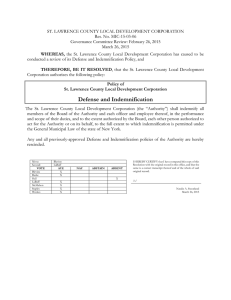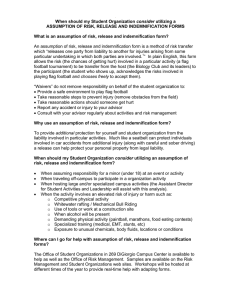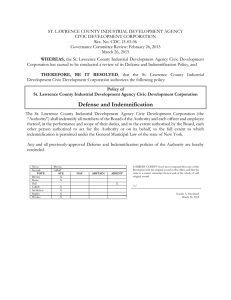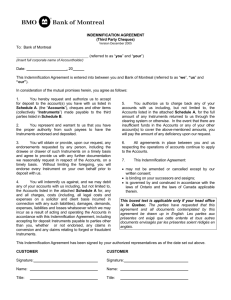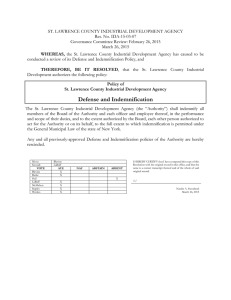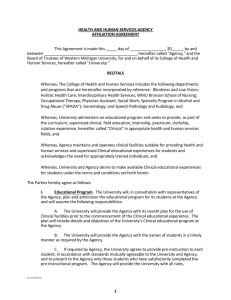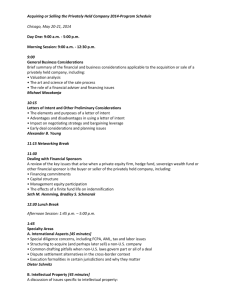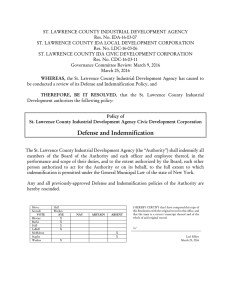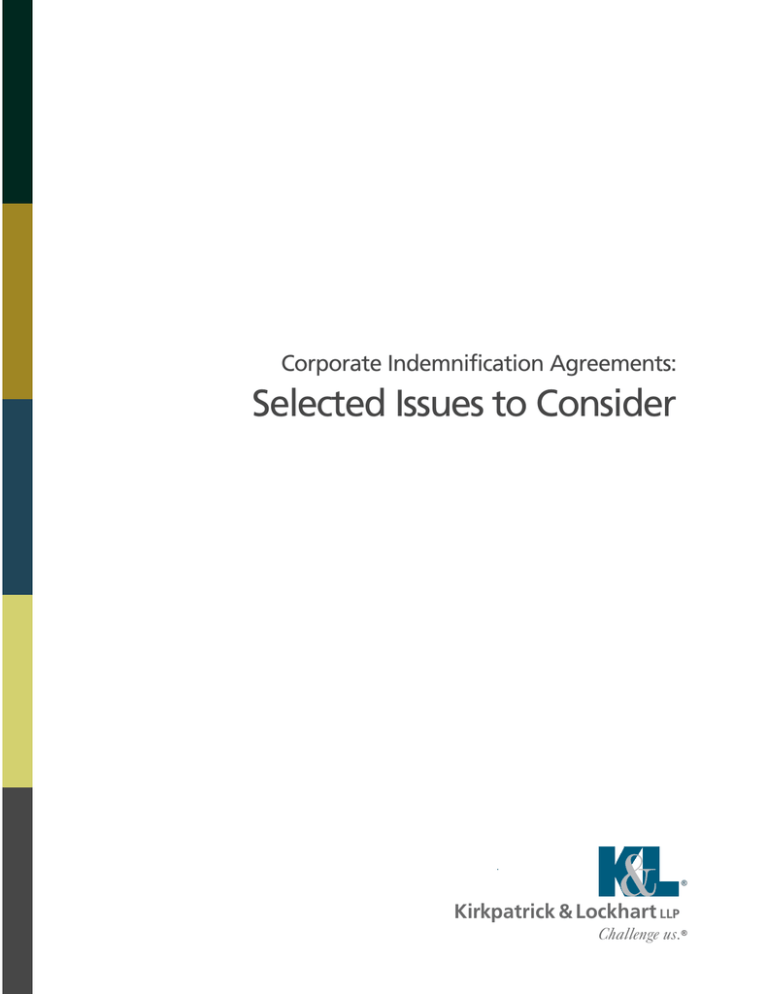
Corporate Indemnification Agreements:
Selected Issues to Consider
®
Kirkpatrick & Lockhart LLP
Challenge us.®
®
Kirkpatrick & Lockhart LLP
Corporate Indemnification Agreements:
Selected Issues to Consider
The Sarbanes-Oxley Act, corporate governance reforms and increased public scrutiny focused on the
responsibilities of corporate directors and officers have led many corporations and their advisers to consider
whether a corporation’s directors, officers and other representatives (collectively, “corporate
representatives”) are adequately protected against the personal liability that can arise from their service on
behalf of the corporation. Corporate representatives can potentially derive protection against personal
liability from various sources, including state indemnification and exculpation statutes, indemnification
provisions of a corporation’s charter or bylaws and coverage under directors’ and officers’ liability insurance
policies. These protections must be considered together and individually as part of a comprehensive
corporate indemnification package.
In addition, depending upon a corporation’s philosophy concerning indemnification of its corporate
representatives and the relative bargaining power between the parties, a corporation might also enter into an
indemnification agreement with selected corporate representatives. An indemnification agreement typically
provides protection for a corporate representative against personal liability that is broader in certain respects
than the protection provided under applicable state law or a corporation’s charter or bylaws. Additionally, an
indemnification agreement provides contractual protection of a corporate representative’s indemnification
rights which ordinarily requires his or her consent to alter or void such rights.
The particular facts and circumstances involved in any situation must be considered in determining
whether contractual indemnification arrangements are advisable or necessary. In evaluating whether the
selective use of indemnification agreements is appropriate for a corporation, consideration should be given
to the extent to which these contracts are perceived to be beneficial in attracting and retaining qualified
corporate representatives, as well as the scope of the protection from personal liability afforded to these
persons from the other potential sources of protection mentioned above.
In addition, state laws may vary with respect to a corporation’s authority to enter into indemnification
agreements with its corporate representatives and as to the potential enforceability of particular contractual
indemnification provisions that deviate from the applicable state indemnification statute. Many state
indemnification statutes include a “nonexclusivity” clause declaring that statutory indemnification is not
deemed exclusive of any other indemnification rights that may be available to a person, including any rights
to indemnification under an agreement. Corporations and their advisers should, however, examine
applicable law, both statutory and common, for potential limits on the extent to which a corporation can
deviate from the applicable statutory indemnification scheme in providing contractual indemnification to
corporate representatives. Additionally, interested director transaction and similar statutory provisions
should also be considered where applicable with respect to a corporation’s approval of indemnification
agreements with selected corporate representatives.
The following list highlights critical indemnification issues that should be considered in the context of
negotiating a comprehensive indemnification agreement.
®
Kirkpatrick & Lockhart LLP
Mandatory Indemnification
A corporate representative is usually entitled to indemnification by the corporation, under state
indemnification statutes, for expenses incurred in defense of a proceeding as a result of serving the
corporation only to the extent he or she is successful in such a defense. Corporations are frequently also
permitted, but not required, to indemnify a corporate representative under permissive state indemnification
statutes. Consideration may be given to including a provision in an indemnification agreement providing for
mandatory indemnification of the corporate representative against personal liabilities incurred as a result of
serving the corporation. Such a contractual provision might, for example, obligate the corporation to
indemnify the corporate representative “to the fullest extent permitted by law.” A contractual right to
indemnification is sometimes predicated on a determination by the board or other reviewing party that a
corporate representative possessed a particular state of mind or met a particular standard of conduct with
respect to his or her actions that form the basis for an indemnification claim.
When contractual indemnification depends on a determination concerning the corporate
representative’s conduct, such a provision frequently mirrors the requirements set forth in the applicable
permissive statutory indemnification provision. For example, the agreement might require a determination
that a person seeking indemnification has acted in good faith and in a manner he or she believed to be in or
not opposed to the best interests of the corporation, and with respect to criminal actions or proceedings, had
no reasonable cause to believe his or her conduct was unlawful. Once a favorable determination is made,
the corporate representative will be contractually entitled to be indemnified by the corporation rather than
being subject to the corporation’s discretion to indemnify pursuant to statutory indemnification. As
discussed below, an indemnification agreement might also contain certain procedural rights in favor of the
corporate representative where such a determination is adverse or is not timely made following a claim for
indemnification. Additionally, even where the corporation’s charter or bylaws include a provision having the
effect of making the corporation’s indemnification obligation mandatory in circumstances where it would be
permissive by statute, a contractual confirmation of such an obligation can provide assurance to a corporate
representative that his or her right to indemnification will not be altered or voided without such person’s
consent.
Mandatory Advancement of Expenses
Corporations are authorized under virtually all indemnification statutes to pay the expenses incurred by
a corporate representative in defending a proceeding in advance of the final disposition of the proceeding.
A contractual right to the mandatory advancement of expenses prior to the disposition of any proceeding can
ensure that a corporate representative has the financial resources necessary to undertake a vigorous defense
in any proceeding arising from actions taken on behalf of a corporation. Applicable state law might require a
corporate representative to furnish an undertaking to repay amounts advanced by a corporation if it is
ultimately determined that he or she is not entitled to be indemnified. Whether an undertaking by a
corporate representative to repay advanced expenses could be deemed to be a company loan in violation of
the Sarbanes-Oxley Act has not been resolved definitively, but the predominant view among corporate
lawyers is that these arrangements should not be likely to violate the Sarbanes-Oxley Act.
2
®
Kirkpatrick & Lockhart LLP
Procedural Matters
A corporate representative may seek certain procedures in an indemnification agreement applicable to
certain determinations regarding the rights and obligations of the parties under the agreement. These
procedures might include placing the burden on the corporation to prove that the corporate representative is
not entitled to payments or advances that he or she claims under the agreement; implementing a litigation
“appeal” right to a judicial de novo determination of indemnification rights where there has been a
determination adverse to the corporate representative; providing for a deemed favorable determination
where there is a failure to act upon a request for indemnification within a certain period of time; and
providing for the right to have an independent “reviewing party” make determinations concerning the right
to indemnification in particular circumstances. In addition, the parties might consider providing in the
agreement that the termination of any proceeding by judgment, order, settlement or conviction, or a plea of
nolo contendere or its equivalent, does not create a presumption or inference that the representative did not
have any particular belief or did not meet any particular standard of conduct, or that a court has determined
that the corporation is not obligated to the corporate representative under the agreement.
Directors’ and Officers’ Liability Insurance
The parties may wish to include a provision that sets forth the obligations, if any, of the corporation to
maintain D&O insurance covering the corporate representative. Such a provision might establish certain
minimum amounts of coverage or specified policy coverage amounts dedicated solely to coverage of
directors and officers, which may be beneficial in the context of corporate bankruptcy. A provision requiring
maintenance of D&O insurance might also include specified circumstances in which the corporation’s
obligation to maintain D&O insurance is limited, or eliminated, for example, due to adverse market
conditions for D&O products. The issues that might be considered in evaluating the terms of a D&O policy
are beyond the scope of this publication.1
Selection of Counsel
The corporation and the corporate representative may want to agree in advance on the circumstances in
which the corporation will advance expenses or indemnify a corporate representative in connection with his
or her retention of separate counsel in any proceeding for which the corporate representative seeks
advancement of expenses or indemnification under the agreement. In particular, the parties might consider
specifying their respective rights and obligations with respect to retention of separate counsel in
circumstances where there may be a conflict between the corporation and the corporate representative in a
covered proceeding.
Fees on Fees
The parties may wish to consider the circumstances, if any, in which the corporate representative is
entitled to reimbursement of expenses incurred in enforcing indemnification rights. The statutory right to
recovery of these amounts, sometimes referred to as “fees on fees,” is unsettled in many jurisdictions and
1
A representative list of issues that a corporation might consider in procuring D&O insurance appeared in an earlier K&L publication
entitled “Checklist of Selected D&O Insurance Issues.” To obtain a copy of this publication, contact Tom Reiter, an attorney in our firm’s
insurance coverage group, at treiter@kl.com.
3
®
Kirkpatrick & Lockhart LLP
under the law of certain states, such as New York, fees on fees will not be recoverable except as contractually
agreed or as otherwise provided by a corporation’s charter or bylaws.2 Consideration may also be given to
agreeing whether or not the corporate representative is entitled to advancement of amounts incurred in
seeking to enforce an indemnification claim against the corporation in advance of the disposition of any such
proceeding.
Covered Proceedings and Expenses
The parties may consider agreeing on the scope of proceedings covered by the indemnification
agreement. For example, the corporate representative may seek assurance that contractual indemnification
rights extend to a wide variety of civil and criminal actions, suits and proceedings, both formal and informal,
including pending, threatened or completed judicial proceedings as well as administrative, investigative and
arbitration and alternative dispute resolution proceedings. In addition, the parties might consider the
circumstances, if any, in which the corporate representative will be entitled to indemnification rights in any
proceeding brought by the corporate representative. The parties may also want to clarify whether the
corporate representative is covered under the indemnification agreement with respect to services rendered
to corporate subsidiaries, benefit plans and other affiliated entities, as well as service on behalf of another
corporation or entity at the request of the corporation.
Consideration may also be given to specifying the expenses and other amounts covered by the
agreement. For example, the parties may want to consider whether the corporate representative is entitled
to be indemnified for judgments and amounts paid in settlement of actions brought by or on behalf of the
corporation, as well as any limitation on indemnification in such circumstances under applicable law. The
parties may also consider clarifying whether expenses incurred preparing for and being a witness are
indemnifiable under the agreement.
Partial Indemnification
Under some circumstances, a corporate representative may be entitled to contractual indemnification
for some but not all expenses incurred in a covered proceeding. The agreement may include a clause that
confirms the corporation’s obligation to indemnify the corporate representative for the portion of expenses
for which he or she is entitled to be indemnified. Partial indemnification may arise, for example, where a
court interpreting an indemnification agreement has determined that certain amounts incurred by a
corporate representative are not appropriate for indemnification, or where it is otherwise determined that a
representative is entitled to be indemnified for amounts incurred with respect to some but not all of the
claims arising in a proceeding for which a representative seeks indemnification.
Changes in Law or the Corporation’s Charter or Bylaws
The right to indemnification and advancement of expenses may be affected by legislation, decisional law
and changes to a corporation’s charter or bylaws. A corporate representative, therefore, may seek to include a
2
4
Two recent court decisions that highlight the potential importance to corporations and their representatives of whether or not
“fees on fees” will be recoverable in the absence of express language providing for such recovery were discussed in the
November 2002 K&L Alert entitled “Can Directors And Officers Recover From Their Corporation Fees They Incur To Obtain Indemnity
From The Corporation Under Applicable Indemnification Agreements and Bylaws? New York and Delaware Courts Take Different
Approaches.” An electronic copy of this Alert is available on our firm’s website at
http://www.kl.com/files/tbl_s48News/PDFUpload307/8076/ca-0210.pdf.
®
Kirkpatrick & Lockhart LLP
provision in an indemnification agreement which provides that any change in law or in the corporation’s charter
or bylaws which narrows the right to receive payments under the agreement will have no effect on the parties’
rights or obligations under the agreement, except as required by applicable law.
Severability
Many jurisdictions have little decisional law determining the validity or enforceability of provisions that
may be included in an indemnification agreement. Accordingly, the parties should consider including a
severability clause that protects the validity and enforceability of the agreement to the greatest extent
possible in the event that any provision is determined, in whole or in part, to be invalid or unenforceable
under applicable law. Enforceability of particular contractual indemnification provisions might be limited
where, for example, a court determines that indemnification under the particular circumstances is contrary
to public policy or where provisions of an agreement are inconsistent with applicable substantive statutory
indemnification provisions and in other circumstances.
Nonexclusivity of Rights
As discussed above, there are potentially many sources of protection for a corporate representative
against personal liability arising from their service in such capacity. For example, corporate representatives
may have indemnification rights under a corporation’s charter or bylaws, statutory indemnification provisions
and D&O insurance. An indemnification agreement may include a provision that makes the right to
indemnification under the agreement nonexclusive of any other rights that the corporate representative may
have from other sources to protect against personal liability.
Change in Control
Corporate representatives may face considerable uncertainties concerning the availability of corporate
indemnification following a change in control of the corporation. For this reason, corporate representatives
may seek a broad successor-in-interest clause providing for continued contractual indemnification rights
following a change in control of the corporation, including a merger or sale of all or substantially all of the
corporation’s assets. A change in control provision may also trigger other rights under the agreement,
including establishment of a “reviewing party” to make determinations of the corporate representative’s
entitlement to indemnification under the agreement upon the occurrence of a change in control.
JERRY H. OWENS
412.355.8678
jowens@kl.com
DAVID J. GRECCO
412.355.8653
dgrecco@kl.com
Jerry H. Owens is a Partner and David J. Grecco is an Associate with Kirkpatrick & Lockhart LLP.
The views expressed in this article are not necessarily those of Kirkpatrick & Lockhart LLP or any of its clients.
This publication is for informational purposes and does not contain or convey legal advice. The information herein
should not be used or relied upon in regard to any particular facts or circumstances without first consulting a lawyer.
© APRIL 2003 KIRKPATRICK & LOCKHART LLP.
ALL RIGHTS RESERVED.
5
BOSTON
75 State Street
Boston, Massachusetts 02109
617.261.3100
DALLAS
2828 North Harwood Street
Suite 1800
Dallas, Texas 75201
214.939.4900
HARRISBURG
Payne Shoemaker Building
240 North Third Street
Harrisburg, Pennsylvania 17101
717.231.4500
LOS ANGELES
10100 Santa Monica Boulevard
Seventh Floor
Los Angeles, California 90067
310.552.5000
MIAMI
Miami Center - 20th Floor
201 South Biscayne Boulevard
Miami, Florida 33131
305.539.3300
NEWARK
The Legal Center
One Riverfront Plaza, Seventh Floor
Newark, New Jersey 07102
973.848.4000
NEW YORK
599 Lexington Avenue
New York, New York 10022
212.536.3900
PITTSBURGH
Henry W. Oliver Building
535 Smithfield Street
Pittsburgh, Pennsylvania 15222
412.355.6500
SAN FRANCISCO
Four Embarcadero Center, 10th Floor
San Francisco, California 94111
415.249.1000
WASHINGTON
1800 Massachusetts Avenue, N.W.
Second Floor
Washington, D.C. 20036
202.778.9000
®
www.kl.com
Kirkpatrick & Lockhart LLP
Challenge us. ®

